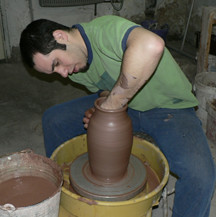Steelton Visit
Last Sunday Jess, the girls and I visited Steelton Mennonite Church for their 75th anniversary worship service.
Jess' earliest church memories are at Steelton, where her family attended from a few months after her birth until she was 4 years old. She continues to recall very formative memories there.
Steelton is a mill town a bit downriver from Harrisburg, PA.
The church was a Lancaster Conference outpost started by missionaries back in the 1930s. In the 60s, the only two Mennonite churches in town, one black and one white, merged out of a sense of calling in solidarity with the civil rights movement.
Jess remembers it as local, multiracial and not oppressively bound to Mennonite ethnic traditions.
The stories we heard last Sunday confirmed this. There were literally hours of storytelling within the Sunday morning service, including from pastors that served from the early 60s to the early 90s. Their theology was refreshingly open. Not much "Lord and Savior" language. But lots of talk about the love of God, supportive community and caring embrace of each other during hard times. The man who pastored in the 1960s was not from Mennonite background, but had become a part of the church in his youth. Several of his siblings followed and have remained pillars of the congregation for 50 years. This was a powerful example of a congregation that has transcended ethnic and cultural boundaries for decades with seeming grace and enthusiasm.
There were also stories of pastors who lived in a parsonage across the street opening their home to any and all in the neighborhood for meals, playtime and fellowship (Jess has memories of this too). I could tell from the stories that pastors and congregants were deeply rooted in this little town and committed to its well-being in their daily lives -- not just on Sunday morning. In its welfare they found their welfare. Sounds like they lived how church is supposed to be, in my estimation.
Last Sunday the church was packed out. It's hard for me to tell what life is like there on an average Sunday these days, but I guess it's not nearly so full. I hope they still embody some of the vibrancy that made for such a meaningful history. I'm so grateful for the impact Steelton had on my wife and, by a degree of separation, on me and my kids. That little neighborhood church shaped Jess' theology, her way of being in the world and her sense of how to "do" church way back in those earliest years of her consciousness. What a gift.
Jess' earliest church memories are at Steelton, where her family attended from a few months after her birth until she was 4 years old. She continues to recall very formative memories there.
Steelton is a mill town a bit downriver from Harrisburg, PA.
The church was a Lancaster Conference outpost started by missionaries back in the 1930s. In the 60s, the only two Mennonite churches in town, one black and one white, merged out of a sense of calling in solidarity with the civil rights movement.
Jess remembers it as local, multiracial and not oppressively bound to Mennonite ethnic traditions.
The stories we heard last Sunday confirmed this. There were literally hours of storytelling within the Sunday morning service, including from pastors that served from the early 60s to the early 90s. Their theology was refreshingly open. Not much "Lord and Savior" language. But lots of talk about the love of God, supportive community and caring embrace of each other during hard times. The man who pastored in the 1960s was not from Mennonite background, but had become a part of the church in his youth. Several of his siblings followed and have remained pillars of the congregation for 50 years. This was a powerful example of a congregation that has transcended ethnic and cultural boundaries for decades with seeming grace and enthusiasm.
There were also stories of pastors who lived in a parsonage across the street opening their home to any and all in the neighborhood for meals, playtime and fellowship (Jess has memories of this too). I could tell from the stories that pastors and congregants were deeply rooted in this little town and committed to its well-being in their daily lives -- not just on Sunday morning. In its welfare they found their welfare. Sounds like they lived how church is supposed to be, in my estimation.
Last Sunday the church was packed out. It's hard for me to tell what life is like there on an average Sunday these days, but I guess it's not nearly so full. I hope they still embody some of the vibrancy that made for such a meaningful history. I'm so grateful for the impact Steelton had on my wife and, by a degree of separation, on me and my kids. That little neighborhood church shaped Jess' theology, her way of being in the world and her sense of how to "do" church way back in those earliest years of her consciousness. What a gift.


0 Comments:
Post a Comment
Subscribe to Post Comments [Atom]
<< Home